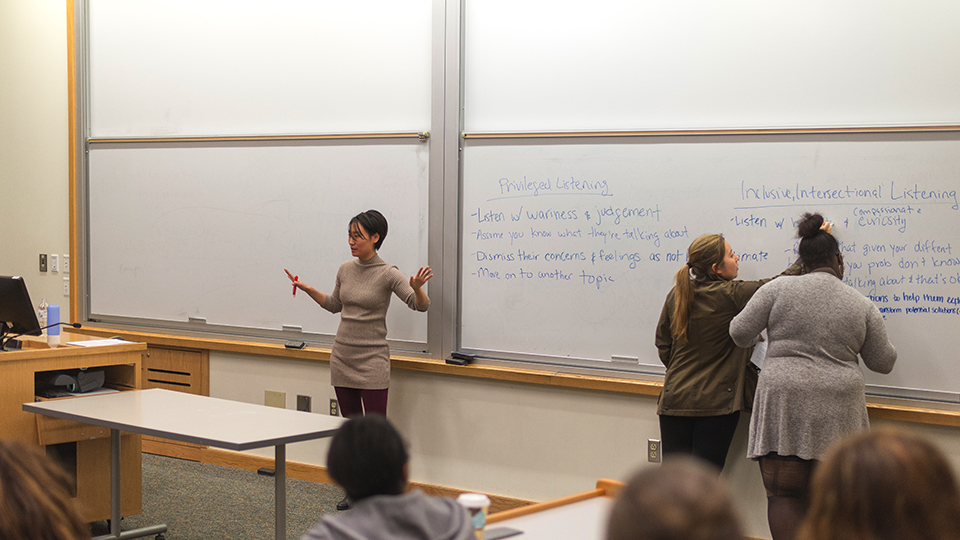News
Sandra Kim leads workshop on campus responses to sexual assault
By Emily Eisler ’17
January 28, 2016
On Tuesday afternoon, Sandra Kim, the founder and publisher of the online magazine Everyday Feminism, came to campus to give a lecture and conduct a workshop on how intersectionality can improve the way college campuses address sexual assault and abuse. Due to the cancellation of her scheduled Monday lecture, Kim delivered both her speech and workshop on Tuesday.
Kim’s previous work in nonprofit issues, such as human trafficking, has given her expert knowledge in intersectional feminism and victim assistance. She began her talk by discussing how the popular concept of sexual violence does not totally encompass the reality most victims face. Kim elaborated on this point by describing many startling statistics about how marginalized communities are affected by sexual assault, which made a powerful impact on her audience.
She talked at length about how marginalized communities, such as people of color, queer and trans* people, disabled people and others are more at risk of assault or abuse than white, heterosexual cisgender people. Kim emphasised the need to acknowledge the experiences of marginalized victims, even though they may not fit the conventional narrative of abuse or sexual assault.
She then went on to explain how campus communities need to create an environment where victims feel safe to come forward and get help, as well as educate people on the issues surrounding sexual assault and violence. She placed a lot of emphasis on allowing the victim to take the lead on how the situation plays out.
Kim then went on to describe the current issues with the ways that campuses currently address assault and abuse cases. First, she discussed barriers to victims self-identifying, such as the dominant narrative of assault not matching many actual experiences, ignoring emotional, verbal and identity abuse and the prevalence of victim blaming.
Secondly, Kim listed many barriers to victims getting the support they needed. In too many cases, victims are not taken seriously, or blamed for their own attack. Also, members of many marginalized communities do not come forward as victims due to the fear of increasing bias against their own community.
Finally, Kim discussed how many people do not want to involve law enforcement in their sexual abuse case due to the negative reputation police have about dealing with sexual crimes.
Kim’s speech finished with instructions on how campuses such as Hamilton’s can handle sexual assault and domestic abuse cases as best as they can. According to Kim, campuses need to have explicit policies about sexual assault and abuse available online, including ones applicable to different marginalized identities. She also emphasized the need for training sessions, like this workshop, for faculty, staff and students.
Kim further called upon the Hamilton community to develop a campus culture that is committed to ending sexual assault through a shift in party culture. Citing statistics on how alcohol is conducive to sexual assault, she described how many factors within partying can create an atmosphere of degradation. If we change certain factors to make parties safer and more inclusive, Kim claimed, there is less likelihood of sexual violation.
By changing party culture, Kim said, students can change the campus narrative on sexual assault. Overall, Kim asked the audience to endeavor to create a culture of support and accountability through ongoing conversations like this one. She then ended her workshop by discussing how individuals can personally help victims of assault and other people in their life through inclusive and intersectional listening techniques.





